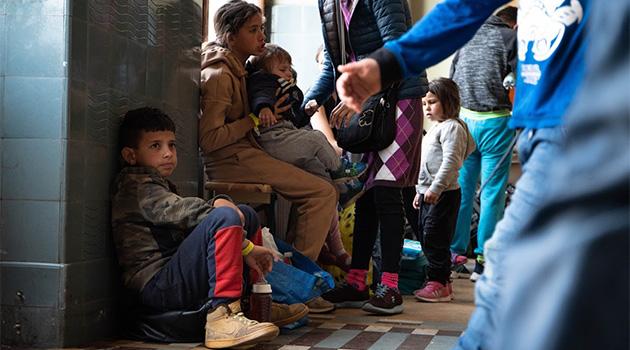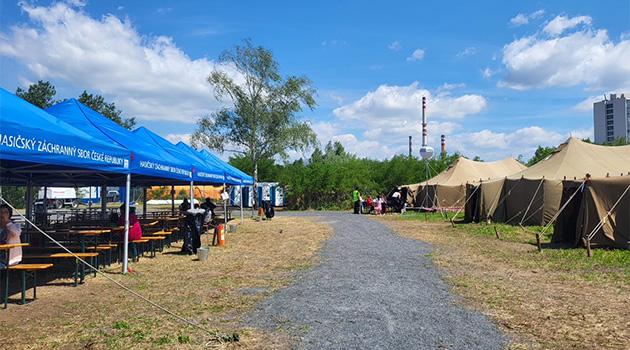Czech research finds one-third of Romani refugees from Ukraine have experienced discrimination here, most children are not in education, dual citizenship has not been "abused" by them

One-third of the Romani refugees from Ukraine in the Czech Republic have encountered intolerance and every sixth Romani refugee has experienced discrimination from the authorities. Most Romani refugees from Ukraine are living in residential hotels or refugee camps in the country.
The vast majority of Romani refugees from Ukraine speak Ukrainian, for two-thirds of whom it is their main language. Those are the findings of a newly-published survey by PAQ Research which refutes the frequent reports alleging that such refugees are actually Hungarian.
Czech Television has also already refuted those allegations by publishing numbers showing that of more than 5,000 requests to verify whether such refugees also hold citizenship in Hungary, just approximately 150 were answered in the affirmative by the Hungarian authorities. The PAQ survey involved representatives of 100 households and focused on the basic characteristics of their members, such as citizenship and languages used.
The survey also investigated the refugees’ health status, financial and material conditions, employment, education and housing. Due to the limited sample size, the findings are approximate with regard to the entire population of Romani refugees from Ukraine and there is a margin of error.
A large part of the households surveyed is experiencing material deprivation. From the survey it also can be seen that support for them should focus on aiding them with administrative tasks and enrolling their children in school.
Most of the Romani refugee children from Ukraine have also absolutely fallen through the cracks of the Czech education system and are not enrolled in school. The nonprofit organizations Awen Amenca, IQ Roma Service, Life Together (Vzájemné soužití) and Romodrom all contributed to collecting the research data, all of which are involved with providing aid to Romani refugees from Ukraine and are in contact with them.
Where did the Romani refugees from Ukraine come from?
Of the households surveyed, 100 % are citizens of Ukraine and just one holds citizenship elsewhere. “The results of our sampling of Romani refugees from different areas of the Czech Republic, therefore, do not confirm the reports about Hungarian refugees and the abuse of dual citizenship,” the PAQ Research report states.
The language spoken in 83 % of the households sampled is Ukrainian, for 61 % of whom it is the main language used. Not quite 20 % of the sampled households mentioned Romanes as their first language and a similar share mentioned Hungarian.
The Romani refugees have relocated to the Czech Republic predominantly from the regions of Transcarpathia (62 %), Dnipropetrovsk (7 %), Kyiv (6 %) and Lviv (6 %) in western Ukraine. Just a minority of the Romani refugees sampled are from eastern Ukraine.
One-third of Romani refugees from Ukraine have encountered discrimination or intolerance in the Czech Republic
The Romani refugees from Ukraine, according to the report, have had to struggle with the trauma caused by their experiences of the war. This also applies to those households who fled areas that had not been directly attacked by the Russian Army prior to the Romani residents’ decision to flee.
“As reasons for coming to the Czech Republic, 28 % of the households said the course of the war in their place of residence was the reason and 72 % said that fear the war would spread to their place of residence was the reason,” the researchers stated in the report. Approximately one-third of the Romani refugees surveyed said their material security is insufficient and every sixth household said it is suffering from hunger.
The refugees have also been struggling with discrimination and intolerance in the Czech Republic. “This is not just about intolerance from the regular population (30 % of the cases), but also from the Czech authorities (14 % of the cases) and from other refugees from Ukraine (9 %). On the other hand, 30 % of the Romani refugees from Ukraine said they have not encountered any of those problems,” the report states.
No access to hot running water for 15 % of Romani refugees in the Czech Republic
The Romani refugees from Ukraine are living most often in residential hotels (40 %) and in centers for refugees, including camps of tents outdoors (34 %). While most Romani refugee families have access to hot running water, bathing facilities and a kitchen, 15 % of the households in the survey said they have no access to hot running water.
Approximately 40 % of the surveyed families said they have no access to any kind of kitchen where they live, not even a communal one. No access to a bathing or cooking facility of any kind was reported by 3 % of the families surveyed.
The researchers also said their survey has just captured those Romani refugees who are enrolled in the state support system and receiving aid from NGOs. “We were unable to interview the households in the most danger,” the authors report.
Education and literacy of Romani refugees from Ukraine
In more than half of the households sampled, all members age 15 years and older know how to read and write, while 80 % of households have at least some members who read and write. Half of the Romani refugees from Ukraine have completed primary education at the most, while 40 % have not completed primary education.
Almost 10 % of those surveyed have completed education beyond the compulsory primary level. “Even if family members know how to read and write, they will not have enough of the necessary skills to process all of the administration required and they will be incapable of acquiring information about how to take advantage of all the possible aid and services available in the Czech Republic,” the report states.
Moreover, 20 % of the households surveyed are also fully illiterate, without a single adult, literate member. “Those households need special support, especially with administrative tasks, ascertaining aid opportunities, etc., ” the research report states.
Most of the children in the households of Romani refugees from Ukraine that were surveyed are not yet being educated in the Czech Republic. Rather, they are attending online instruction from Ukraine to a limited extent, not attending Czech schools, and only rarely taking advantage of services such as adaptation groups.
Of course, these families want to enroll their children in education. Many (39 %) are waiting for the new school year to begin.
Other reasons for not enrolling children into education were given as the children’s insufficient knowledge of the Czech language (20 %), housing insecurity (18 %), not enough places available in the schools (7 %) or an absence of educational opportunities. According to the research, it will be crucial to include these children into education this autumn so as to prevent their falling out of the educational process permanently.
Most of the surveyed children who had been educated in the Czech Republic in the spring were in groups with other Romani refugees in their place of accommodation or in classes where all of the children were from Ukraine; just 9 % attended a class with Czech children. In comparison with the larger sample of all refugees from Ukraine, Romani pupils mainly of primary school age are the ones most likely not to be attending school.
“Among the Romani refugees from Ukraine, 78 % of primary school-aged children are not attending school at all, compared to just 13 % of the general population of refugees from Ukraine,” the report adds. Although Russia’s aggression against Ukraine continues to proceed and the situation in many regions there is unstable, many Romani refugees are thinking about returning or said they are planning to do so.
However, just 7 % of the Romani refugee households surveyed said they want to return to Ukraine in the next few weeks or months. Approximately half of the households of Romani refugees would like to return to Ukraine at some point.
The other half of the surveyed households either said they are not certain or that they are considering settling outside of Ukraine. “The proportion of refugees intending to return to Ukraine is therefore slightly lower than the sample of all Ukrainians in the Czech Republic, 63 % of whom are planning to return within the next two years,” the PAQ Research report states.
